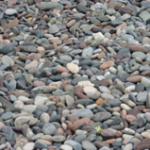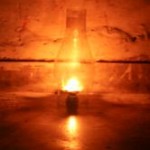 The traumas of a tree’s life are visible on the surface, as knots form and bark curls around to protect and restore the damaged places.
The traumas of a tree’s life are visible on the surface, as knots form and bark curls around to protect and restore the damaged places.
How might you treat those around you differently if you could read their life stories in their skin?
 L’shana tova! Today is Rosh Hashana, the first day of the new year in the Jewish calendar. It marks the beginning of ten Days of Turning, during which Jews are expected to examine their lives and make amends for any damaged relationships.
L’shana tova! Today is Rosh Hashana, the first day of the new year in the Jewish calendar. It marks the beginning of ten Days of Turning, during which Jews are expected to examine their lives and make amends for any damaged relationships.
Who might you apologize to, what relationship might you mend in the course of these ten days?
 Each stone on a beach or in a riverbed is unique, no two alike. But, in the end, they’re not that different, either. You are unique and precious—but no more unique and precious than any of the billions of other people in the world.
Each stone on a beach or in a riverbed is unique, no two alike. But, in the end, they’re not that different, either. You are unique and precious—but no more unique and precious than any of the billions of other people in the world.
How will you stand out in the crowd? How will you help someone else be noticed?
 Sometimes solitude is a burden, bringing a sense of loneliness or abandonment, a feeling that we are lost and alone. Sometimes solitude is a blessing, a peaceful moment when we can return fully to our own self, a time apart to finally rest in the quiet. Either way, it is a temporary state. The footprints of those who share our lives always surround us.
Sometimes solitude is a burden, bringing a sense of loneliness or abandonment, a feeling that we are lost and alone. Sometimes solitude is a blessing, a peaceful moment when we can return fully to our own self, a time apart to finally rest in the quiet. Either way, it is a temporary state. The footprints of those who share our lives always surround us.
Today, do you seek solitude or company? Whose footprints will the ocean erase, and whose will continue to appear alongside your own?
 “Therefore, be ye lamps unto yourselves, be a refuge to yourselves. Hold fast to Truth as a lamp; hold fast to the truth as a refuge. Look not for a refuge in anyone beside yourselves. And those, who shall be a lamp unto themselves, shall betake themselves to no external refuge, but holding fast to the Truth as their lamp, and holding fast to the Truth as their refuge, they shall reach the topmost height.” – Gautama Buddha
“Therefore, be ye lamps unto yourselves, be a refuge to yourselves. Hold fast to Truth as a lamp; hold fast to the truth as a refuge. Look not for a refuge in anyone beside yourselves. And those, who shall be a lamp unto themselves, shall betake themselves to no external refuge, but holding fast to the Truth as their lamp, and holding fast to the Truth as their refuge, they shall reach the topmost height.” – Gautama Buddha
How will you find refuge in yourself today?